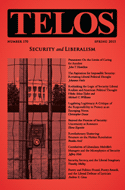Christopher Lasch’s “Liberalism and Civic Virtue,” from Telos 88 (Summer 1991), seeks to gain a better understanding of the internal contradictions of liberalism in one of its most optimistic moments. With the fall of the Berlin Wall, Western economic and political liberalism stood as the last-remaining major ideology of the twentieth century. Amidst the euphoric optimism surrounding the “end of history,” Lasch looks at the challenges that liberalism, with no major competitors on the world stage, poses to itself rather than those posed to it from the outside; for it might just be that liberalism itself is decaying like other major twentieth-century ideologies, though this process is merely delayed.
|
It is unlikely that the present EU will ever become politically unified. However a reduced number of member states could constitute a European Federal League designed to become, as such, a new member of the EU in place of the federated states. It could consequently operate separately on a number of issues. Other members might join the new Federal Union later, under certain conditions. Martin J. Sklar, who died in 2014, was a historian, left-wing activist, and original thinker. As a scholar/journalist-activist, he founded Studies on the Left, co-founded Socialist Revolution and In These Times, and was a founding member of The Historical Society. As a historian, he originated the influential concepts of “corporate liberalism” and “disaccumulation” and shaped the thinking of historians of the Progressive Era, the Jefferson–Hamilton divide, Lincoln’s revolutionary role in ending slavery, the sources and consequences of U.S. imperialism—and more. With the publication of “The Crisis of Western Societies” (1982), Cornelius Castoriadis returns to an early theme in his work by proposing that over the previous twenty years Western societies had begun to enter a new phase, one that could be considered to be a situation of crisis. In his earlier political thought—associated with Socialisme ou Barbarie—Castoriadis identified signs of a transition into this new phase, marked by a widespread bureaucratization of political decision-making that emerged alongside a general turn toward the privatization of social life. At the time of his revisitation of this theme, Castoriadis’s work had undergone what would be the first of two ontological turns: a turn that involved a radical rethinking of historicity, which understood the historical dimension of society as a socially contingent mode of creation that is central to the constitution of the world of a given society. This article reflects an articulation of his previous theme of crisis with regard to this broader rethinking of historicity throughout the 1970s, which extended political analysis into more foundational issues of social institution and cultural expression. In his essay “Carl Schmitt on Friends, Enemies and the Political,” Andrew Norris inquires into the question that I have been interested in for quite some time: political friendship in Carl Schmitt’s political philosophy. Schmitt’s interpreters usually focus on the issue of enmity in his concept of the political, not least because Schmitt himself elaborates on the existential significance of political enmity much more extensively. From a conceptual point of view, however, political friendship should be viewed as at least equally relevant a part of Schmitt’s account of the political. The specific criterion of the political is famously the distinction “between friend and enemy,” not simply an indefatigable presence of political enmity. Norris should be lauded for his attempt to foreground a crucial, though still insufficiently explored, notion of a political (public) friend in Schmitt’s Concept of the Political. |
||||
|
Telos Press Publishing · PO Box 811 · Candor, NY 13743 · Phone: 212-228-6479 Privacy Policy · Data Protection Copyright © 2025 Telos Press Publishing · All Rights Reserved |
||||



